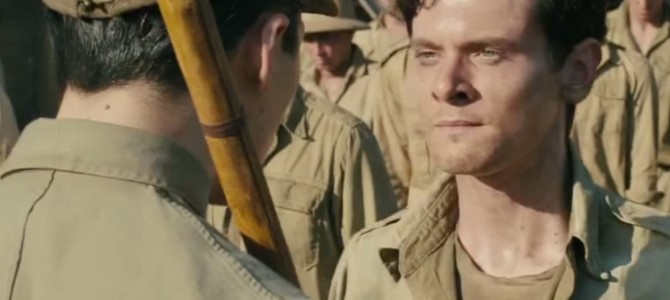Angelina Jolie’s blockbuster adaptation of Laura Hillenbrand’s best-selling novel “Unbroken” is no accident. Her second turn in the director’s chair delivers a beautiful movie. A carefully crafted celebration of human spirit and dignity in the worst of times, “Unbroken” soars on a great story, deft direction, fine acting, and a moral core that is largely absent at the theater.
The film tells a true story about a real person. Louis Zamperini (Jack O’Connell) was an Italian son of immigrants growing up in 1930s America when he discovered a passion for speed. His legs took him to the 1936 Olympics in Berlin, where he placed eighth in the 5000 meter but dazzled the world with a spectacularly fast lap. He couldn’t run away from war, though, and the 1940s found him in the South Pacific. Shot down with his crew, he survived 47 days at sea, only to be captured by the Japanese. The brutal treatment at the P.O.W. camp and Zamperini’s refusal to let it break his spirit form the bulk of this movie.
The film unflinchingly depicts the brutality man can inflict on man. Takamasa Ishihara plays Mutsushiro Watanabe, a camp warden known as “The Bird.” Armed with a bamboo stick and a psychotic personality, he delights in inflicting pain on Zamperini. O’Connell is good as Zamperini, but Ishihara does a fantastic job portraying a monster. Jolie does not flinch or make excuses for his brutality. War gives free reign to those who enjoy hurting their fellow man, she seems to say.
But that’s not the end of the story.
A Victimized Man Retains His Humanity
The heart of the movie, and the emotion that gives it its power, is the message to which Jolie has dedicated her recent work: Hope is stronger than hate, love is stronger than evil, forgiveness breaks the cycle. A man may be physically imprisoned, but is only beaten if they take away his humanity. Zamperini retains his. A scene in which his will overcomes the bile of his captor stands with the best cinematic moments of 2014.
There’s not a cynical moment in this film, and that feels as refreshing as a cool breeze.
Ten years ago, we would never have seen this coming. It’s now safe to say Jolie has taken a decisive turn in her career. Gone are the days of “Girl, Interrupted” and “Lara Croft.” Even action hero Salt is on the shelf. Instead, she carefully chooses projects that reflect her interests both on and off the screen: justice, reconciliation, and the human spirit. This film is not as artsy or brutal as her directoral debut, “In the Land of Blood and Honey,” but it retains some of the same themes. Her other 2014 movie, “Malificent,” also has the same message.
Jolie has taken the lessons she’s learned in refugee camps and war zones and turned them into art. Her voice is all the more powerful because it’s informed by real-world experience and not Hollywood cocktail parties far from any front.
A Message of Hope to the World
Rated PG-13, “Unbroken” tones down some of the brutality seen in the R-rated “In the Land of Blood and Honey,” but it can be hard to watch. The film depicts starvation, violence and torture, but with a lower-level of violence than some films. There are few women in the film and no sexual situations. There is slight deprivation-related nudity and brief strong language. It would be an appropriate movie for mature teens, but too intense for younger viewers.
The script by Joel and Ethan Coen respectfully remains true to its source material. Jolie’s adaptation deftly embraces the faith of Zamperini’s family and friends. It opens in church, a scene which is neither mocking nor trite. The film has a running dialog between Zamperini and God, including a soldier’s prayer promising to serve God. Zamperini eventually kept that promise. The film does not depict Zamperini’s descent into alcohol after the war, nor his conversion at a Billy Graham crusade, which he credits with saving his life. He became a Christian speaker and inspiration to many. The epilogue refers to his faith, but that part of the story is not onscreen.
That fact shouldn’t take away from what is onscreen. “Unbroken” is a very good movie, one of the best of 2014. It’s a great American story that transcends America’s borders. All of the media focus is on a banned buddy comedy now, but “Unbroken” is the film that will bring hope and inspiration not only to American audiences, but those suffering in war zones and under dictators the world over. That makes it a far more dangerous movie to oppressors than “The Interview” could ever be.









